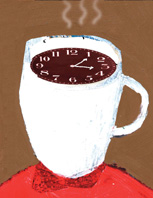Issue Archive
Israeli Life: Being There

I didn’t know Ethiopians had a coffee ceremony—a kind of African version of the Japanese tea ceremony—until during a visit to the country from Israel, I witnessed a woman behind the counter of an Addis Ababa bar slowly rinsing coffee beans.
Deliberately and with great concentration, she passed a round tin pan filled with one layer of fresh beans back and forth under running water. Eventually, “Ethiopian cultural coffee” would be brewed from these very beans.
Eventually is right. I didn’t get to see the rest of the ceremony (called buna) in the bar, but a week later, after a lunch that was more a feast in the home of an Ethiopian Israeli friend’s sister, I not only saw but participated in the ceremony. Start to finish—washing the beans, drying them slowly over a flame, turning the beans with a long-handled implement as they roasted, grinding them to a fine powder with a mortar and pestle, and brewing—took an hour. An hour to make coffee in the middle of the day! Who has that kind of time?
Ethiopians do. That commodity we Israelis are constantly out of and constantly seeking seems a given with our African brothers and sisters. The coffee ceremony, or the kind of culture that engenders it, may be the secret behind the tranquillity many of us admire in the Ethiopians we see or know. The other day I was late for a work meeting with an Ethiopian friend. He greeted me with a smile and said, “Ah, you’re on Ethiopian time.”
The house I was in for lunch had only one room but the couple who lived in it smiled a lot. After four years of unemployment, Tesfaye was working as a security guard. Meseret is expecting their first child. When we went into the common courtyard to roast the coffee beans, several neighbors joined us. One brought the popcorn that’s part of the ceremony; another lit the fire to roast the cardamom (also part of the ceremony) simply for the aroma—kind of like homemade incense.
As one of the neighbors and I took turns grinding the beans, Meseret told me that when her sister, Talalu, had made aliya she had thrown away her mortar and pestle (she made a gesture of throwing something into the bushes). In Israel, Talalu had proudly said, she would have an electric coffee grinder.
In her Neve Yaakov apartment, Talalu has an electric injara (Ethiopian flat bread) maker. She works full time cleaning in a factory, then stays up late cooking, cleaning her house and taking care of her husband and two teenage daughters. But she still seems to have time. She hugs better than anyone I know. She laughs a lot. She looks you in the eyes when she talks to you. Like other Ethiopians I know, she listens without interrupting—practically a lost art in our culture. When she’s with you, you feel she’s all there, heart and soul.
Maybe that’s the secret embodied in the coffee ceremony. Maybe it’s not that Ethiopians have more time, but that they tend to be fully there in the time they have. Perhaps growing up in a society in which a whole hour is devoted to making coffee instilled in them an inner bliss, the ability to be fully in the moment, something we all strive for with our meditation practices and our yoga classes.
Roasting and hand-grinding your own coffee beans not only gives you excellent coffee, it forces you to slow down. When your hands are busy in some productive activity, it creates an oppurtunity to connect with those around you in a way that seems easier and more natural. It provides space for being together in silence as well.
A friend calls the Ethiopians in our midst a national treasure. If we can become imbued with their calm presence, we pressured, harried Israelis will have gained a treasure ourselves.
Coffee, anyone?










 Facebook
Facebook Instagram
Instagram Twitter
Twitter
Leave a Reply